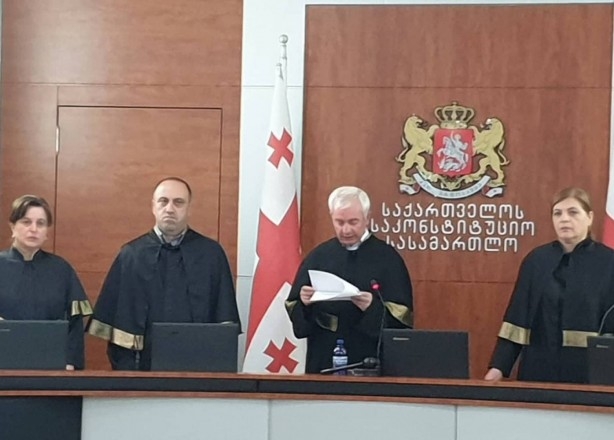RULING ON THE CASE OF “VASIL SAGANELIDZE AGAINST THE PARLIAMENT OF GEORGIA”
RULING ON THE CASE OF “VASIL SAGANELIDZE AGAINST THE PARLIAMENT OF GEORGIA”
On 24 October 2019, the second board of the Constitutional Court of Georgia delivered a ruling on the case of “Vasil Saganelidze vs. the Parliament of Georgia“(constitutional complaint N1237).
According to the disputed norm, the right of compulsory examination at the investigation stage of a witness before a magistrate judge was only granted to the prosecution.
The complainant argued that the defence, equally to the prosecution, must enjoy the right of compulsory examination of a witness before a magistrate judge. Conferral of this right only to one party gave a significant procedural advantage to the prosecution, which violated the principles of equality of arms in criminal proceedings (Article 31.4 of the Constitution of Georgia). The complainant considered the disputed act identical to the regulation that has already been declared unconstitutional by the Constitutional Court (Judgement N2/13/1234,1235 decided on 14 December 2018) and requested the Constitutional Court to invalidate the disputed norm at the preliminary stage without hearing the case on merits.
In accordance with legislation, the Constitutional Court has the power to invalidate the provision overruling its judgement in a simplified procedure, without consideration a case on merits. Pursuant to Article 25(41) of the Organic Law of Georgia on the Constitutional Court of Georgia, “If the Constitutional Court ascertains at the preliminary session, that the disputed normative legal act or the part thereof contains rules of the same content as those that had already been declared unconstitutional, ... it will adopt a ruling on non-admissibility of the case for consideration on merits and on invalidation of a disputed act or part thereof.”
The Constitutional Court sided with the complainant’s position and ruled that disputed norm, similarly to the norm already found unconstitutional by the Constitutional Court (Judgement N2/13/1234,1235) granted significant advantage to the prosecution over the defence. Namely, by conferring the right of prior examination of witnesses, the prosecution enjoyed the possibility to better prepare for substantive hearing of a case. At the same time, the foregoing restriction could not be balanced by granting the defence the right of compulsory examination of witnesses at the substantive hearing of a case.
Therefore, the Constitutional Court of Georgia satisfied the complainant’s appeal and found disputed norm unconstitutional at the preliminary stage without hearing the case on merits.
In addition, for the purpose of avoiding any threats related to the effective functioning of investigation and administration of criminal justice, the Constitutional Court postponed the enforcement of its judgement until 31 March 2020.
The complainant also challenged the constitutionality of the legal norm, which excludes the participation of the defence in an examination of witnesses before a magistrate judge. It was argued that the named regulation did not allow the defence to cross-examine witnesses and thus, contradicted with the right to a fair trial.
The Constitutional Court noted that the constitutionality of the restriction of participation of the defence at the stage of an investigation, including the possibility of cross-examination has already been assessed and found constitutional by the Constitutional Court of Georgia by its judgement N2/13/1234,1235 decided on 14 December 2018. Accordingly, this part of the constitutional complaint was rejected by the Constitutional Court.


